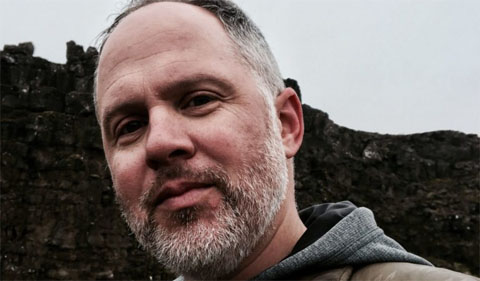
Dr. Kevin Uhalde, in Iceland, which serves as one of the key filming areas for the series.
Veja, one of Brazil’s major weekly magazines, recently interviewed Dr. Kevin Uhalde, Associate Professor of History at Ohio University, about the historical inspirations and parallels for the hit series Game of Thrones. The article, published in Portuguese and titled “Find Out What’s Real in ‘Game of Thrones,’” features a number of historians’ views on the matter.
Despite its clear inspiration from medieval and early modern European history, the past has little to tell us about the future plot trajectory in Game of Thrones. That might be the most historically accurate element of the series. For Uhalde, Game of Thrones is quite adept at showing how the fate of powerful people in the middle ages was unpredictable. Historically, wealth and power were necessary but not sufficient factors in securing one’s rule or that of their family.
[Series Spoiler Alert: If you prefer to not learn about some of the character trajectories in the series, it is best you not read what follows and skip to Dr. Uhalde’s research and teaching interests.]
In the series, the character of Cersei Lannister has attracted a range of commentary about women, gender, and history. In the Veja article, Uhalde draws a parallel between Cersei and the Byzantine consort Irene. As the article put it, “A widow, Irene became regent, because her son Constantine VI was too young, and finally secured the title of empress.” Uhalde observed that Irene eventually had her son’s eyes gouged out—something not even Cersei attempted.
Religion in the series also offers important parallels. For the Veja author, many elements of religious belief and practice in Game of Thrones “are inspired by . . . Persian religions that influence Judaism, Christianity, and Islam, for example, with their belief in dualism, paradise, resurrection, and a messiah.” But for Uhalde, there are also parallels with the beginning of Christianity: “Not only in the tension between monotheism and other more common religions, polytheists, but also in the potential political advantage offered by religious conversion.”
Read the complete Veja article (in Portuguese).
Uhalde’s Research and Teaching Interests
Uhalde has given other interviews on Game of Thrones, including one for Slate.com last year (profiled on Forum). He teaches a course on medieval history in popular culture, which he will be offering in Spring 2018: HIST 1222: Medieval History in Film and Literature.
By training, Uhalde is a historian of the Mediterranean and Western Europe during Late Antiquity and the Middle Ages. His research focuses on the formation and varieties of Christian societies, as well as law and legal culture in practice. Uhalde’s first book, Expectations of Justice in the Age of Augustine (University of Pennsylvania Press, 2007) highlights his interest in how intellectuals, including religious professionals and secular officials, handled the ordinary failures of society.
In addition to his History Department position, Uhalde is an active faculty member in the Center for Law, Justice & Culture.
During Fall 2017, Uhalde is offering the following courses:
- HIST 3111J: Historical Research & Writing
- HIST 3293: World of Late Antiquity
In Spring 2018, Uhlade will be offering the following courses:
- HIST 1222: Medieval History in Film and Literature
- HIST 3540: History of Early Christianity
Read more about Uhalde’s research and teaching interests on his department web page.



















Comments